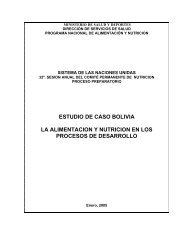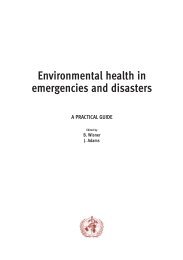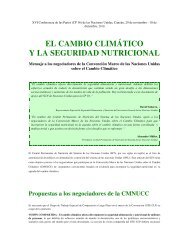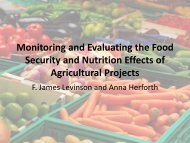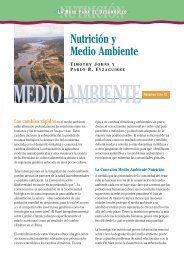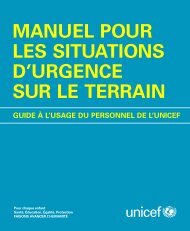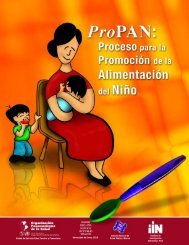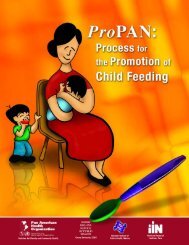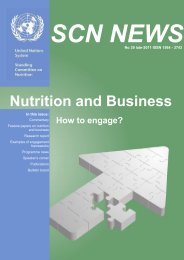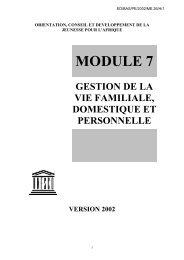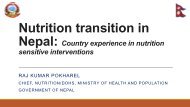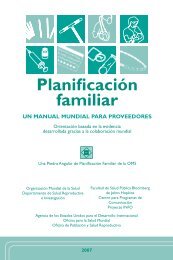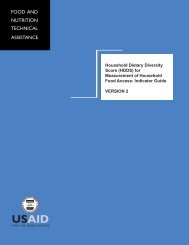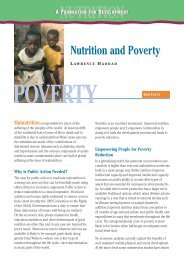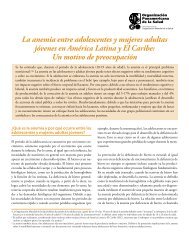SCN News No 36 - UNSCN
SCN News No 36 - UNSCN
SCN News No 36 - UNSCN
You also want an ePaper? Increase the reach of your titles
YUMPU automatically turns print PDFs into web optimized ePapers that Google loves.
78<br />
PUBLICATIONS<br />
www.unsystem.org/scn<br />
Global obligations for the right to food<br />
Kent G (ed.)<br />
The purpose of this book is to clarify<br />
and strengthen the obligations of the<br />
global community in relation to the<br />
human right to adequate food. It explores<br />
the various actions that should<br />
be taken by governments, nongovernmental<br />
organizations, and<br />
individuals to ensure that all people<br />
of the world have access to adequate<br />
food, and assesses the nature<br />
and depth of the global responsibility<br />
to ensure adequate food for the<br />
world's population. This book was prepared by a Task Force of<br />
the Working Group on Nutrition, Ethics, and Human Rights of the<br />
<strong>SCN</strong>. Its eight chapters authored by Kent G, Künnemann R and<br />
Ratjen S, Donati F and Vidar M, Brady M, Gupta A, Latham M,<br />
Cohen M and Ramanna A, and Vivek S, are followed by reflections<br />
by the editor and a total of 43 specific recommendations<br />
formulated by the group of individual authors and addressed to<br />
the global community and a broad range of actors, including UN<br />
agencies, governments and civil society actors. The recommendations<br />
are grouped into seven broad areas of global-level state<br />
obligations, intergovernmental organizations, nonstate transnational<br />
actors, humanitarian assistance, nutrition of mothers, infants<br />
and pre-school children, nutrition of school-age children,<br />
access to plant genetic resources for food and agriculture, and<br />
food sovereignty. The recommendations concern the role that<br />
the global community should play in implementing rights-based<br />
plans to eradicate hunger and malnutrition, and could serve as<br />
building blocks for such a global plan.<br />
www.rowmanlittlefield.com<br />
The book is based in part on an earlier book by George Kent,<br />
Freeedom from Want: The Human Right to Adequate Food (online)<br />
World Development Report 2008:<br />
Agriculture for Development<br />
The World Bank<br />
(online, E/F/S/P/A/R/C)<br />
This report provides guidance to<br />
governments and the international<br />
community on designing and implementing<br />
agriculture-for-development<br />
agendas that can make a difference<br />
in the lives of hundreds of millions of<br />
rural poor. The Report highlights two<br />
major regional challenges. In much<br />
of Sub-Saharan Africa, agriculture is a strong option for spurring<br />
growth, overcoming poverty, and enhancing food security. Agricultural<br />
productivity growth is vital for stimulating growth in other<br />
parts of the economy. But accelerated growth requires a sharp<br />
productivity increase in smallholder farming combined with more<br />
effective support to the millions coping as subsistence farmers,<br />
many of them in remote areas. Recent improved performance<br />
holds promise, and this report identifies many emerging successes<br />
that can be scaled up. This Report addresses three main<br />
questions: What can agriculture do for development? What are<br />
effective instruments in using agriculture for development? How<br />
can agriculture-for-development agendas best be implemented?<br />
www.worldbank.org<br />
<strong>SCN</strong> NEWS # <strong>36</strong> back to contents<br />
Towards food sovereignty: reclaiming autonomous<br />
food systems<br />
Pimbert M (online)<br />
Towards Food Sovereignty is an<br />
online book with linked video and audio<br />
files. The first three chapters,<br />
available here, begin to describe the<br />
ecological basis of food and agriculture,<br />
the social and environmental<br />
costs of modern food systems, and<br />
the policy reversals needed to democratize<br />
food systems. The video and audio clips show farmers,<br />
indigenous peoples and consumers all working to promote food<br />
sovereignty, it highlights the importance of locally controlled food<br />
systems to sustain both people and nature.<br />
www.iied.org<br />
Nutrition Beyond the Health Sector: A Profile of<br />
World Bank Lending in Nutrition from 2000 to 2006<br />
Garrett J and El Hag El-Tahir S<br />
(online)<br />
The World Bank report Repositioning<br />
Nutrition as Central to Development<br />
explicitly recommended improving nutrition<br />
by not only working through the<br />
health sector, but also in non-health<br />
sectors such as agriculture and education.<br />
This report provides descriptive<br />
and financial profiles of the Bank's recent<br />
portfolio in nutrition (from FY2000 to late FY2006) to note the<br />
extent to which the Bank has actually gone outside the health sector<br />
to work on nutrition. In this period, 41 projects were assigned a<br />
theme of "food and nutrition security." Just over half of them (22<br />
out of 41) had nutrition-related components or activities. Of these<br />
22 projects, half fell within the health sector, and half fell outside.<br />
www.worldbank.org<br />
Dietary Diversity as a Measure of<br />
Women’s Diet Quality in Resource-Poor Areas:<br />
Results from Rural Bangladesh Site<br />
FANTA/USAID/IFPRI (online)<br />
Results from Rural Bangladesh Site<br />
Simple population-level indicators are<br />
needed to assess the quality of<br />
women’s diets and to monitor progress<br />
in improving diets. FANTA is<br />
working with a number of researchers<br />
on a Women’s Dietary Diversity Project<br />
(WDDP), whose broad objective<br />
is to use existing data sets with dietary<br />
intake data from 24-hour recall to analyze the relationship<br />
between simple indicators of diet diversity–such as those that<br />
could be derived from the new Demographic and Health Surveys<br />
(DHS)–and dietary quality for women. With funding from<br />
USAID’s Bureau for Global Health, the WDDP is analyzing data<br />
sets from five countries: Bangladesh, Burkina Faso, Mali, Mozambique<br />
and the Philippines. The final report for Bangladesh<br />
indicates that food group diversity indicators may be a simple<br />
and valid option for population-level assessment and for monitoring<br />
progress toward improved micronutrient intakes among<br />
women of reproductive age.<br />
www.fantproject.org www.usaid.gov www.ifpri.org



